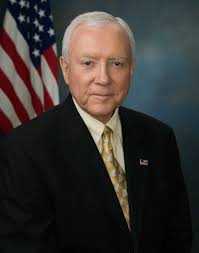 WASHINGTON, D.C.—This week, Senator Orrin Hatch (R-UT), along with Senators Steve Daines (R-MT) and Deb Fischer (R-NE), introduced the Highway Rights-of-Way Permitting Efficiency Act of 2017, a bill that will streamline broadband permitting in existing highway rights-of-way for broadband infrastructure projects.
WASHINGTON, D.C.—This week, Senator Orrin Hatch (R-UT), along with Senators Steve Daines (R-MT) and Deb Fischer (R-NE), introduced the Highway Rights-of-Way Permitting Efficiency Act of 2017, a bill that will streamline broadband permitting in existing highway rights-of-way for broadband infrastructure projects.
“One of the most efficient ways to close the opportunity and innovation gap between rural and urban communities is to expand broadband infrastructure,” Hatch said. “This effort is critical to improving education, transportation, public safety, healthcare, and the economy. With access to fast internet, Utah’s businesses can compete with companies across the world. This much-needed legislation helps rural broadband providers by streamlining the deployment of broadband infrastructure across federal lands. It will save Utahns precious time and resources and will also ensure that our state remains a national leader in providing broadband services.”
“We need to reduce the rural and urban divide in digital connectivity,” Daines stated. “By eliminating unnecessary regulations we can more rapidly connect rural America and deploy broadband infrastructure.”
“Connecting Nebraskans, especially those living in our rural areas, is a top priority for me,” Fischer said. “This legislation takes critical steps to streamline the permitting process for new broadband infrastructure projects. By reducing red tape, we can help more Nebraska families access broadband services.”
Background
Rural broadband providers and rural communities are in need of assistance to streamline the deployment of broadband infrastructure in highway rights-of-way (ROW). Duplicative federal permitting laws and regulations, agency mismanagement, and poor cross-agency communication causes project delays and cost-overruns.
Currently, broadband providers undertaking projects to install broadband infrastructure in ROW may be required to obtain approval from multiple agencies, including: the Federal Highway Administration (FHWA), state departments of transportation, the Bureau of Land Management (BLM), and the Forest Service (FS). This process includes running the gamut with National Environmental Policy Act (NEPA) compliance, which often requires separate environmental assessments or impact statements for a single project. These duplicative reviews cause unnecessary years-long delays in processing and cost overruns. They also discourage providers and states from pursuing broadband deployment projects, particularly in rural areas.
Bill Details
State Permitting Authority
- In pulling from the successful FHWA “NEPA Delegation Program,” which delegates federal environmental compliance to a state, this bill allows a state to opt-in to an agreement to take on the responsibility of environmental review—on behalf of the relevant federal agency.
Categorical Exclusion
- Provides a categorical exclusion for any broadband project within an existing operational ROW.
Federal Broadband Permit Coordination
- Designates a lead agency in the federal permitting process, regardless of whether a state opts-in to the “State Permitting Authority” agreement;
- This will consolidate efforts from the executive branch and create a single POC for a given broadband deployment project, intending to drive efficiencies into the permitting process.
Statements of Support
Carlos Braceras, Executive Director, Utah Department of Transportation
“Thank you to Chairman Hatch for introducing this important bill. The Utah Department of Transportation has successfully partnered with the private sector to deploy broadband in support of highway operations. Unfortunately, the federal permitting process has, at times, slowed or inhibited installation of fiber with our private sector partners. This bill will streamline the permitting process helping to speed broadband deployment statewide, especially in the rural, underserved areas of our state. We appreciate Senator Hatch’s vision to see the future of transportation with the merger of technology between motor vehicles and infrastructure leading to greater mobility and increased safety on our nation’s roads.”
Bruce H. Todd, CEO/General Manager, STRATA Networks
“We commend Senator Hatch and his attentiveness to the criticality of broadband connectivity in rural America. We appreciate, and fully support, Senator Hatch’s efforts to coordinate and streamline the permitting of broadband projects on federal lands.”
Val Hale, Executive Director of the Governor’s Office of Economic Development
“Broadband infrastructure is an important economic development factor, particularly in rural parts of the country. The Highway Rights-of-Way Permitting Efficiency Act of 2017 will help improve coordination between state and federal agencies to speed up access to federal rights-of-way. We anticipate this legislation will make it easier for Utah’s residents and businesses to obtain broadband service and participate in a global economy.”
Brock Johansen, 1st Vice President, Emery Telcom
“Senator Hatch and his staff have worked tirelessly on providing a solution to the delays that the broadband providers are experiencing when permitting across federal land. This Rural Broadband Bill will serve to greatly enhance the deployment of Broadband throughout America.”
Ray Timothy, CEO and Executive Director, Utah Education and Telehealth Network
“UETN wholeheartedly supports Senator Hatch’s Highway Rights-of-Way Permitting Efficiency Act of 2017, because we believe that this bill will create greater efficiency in obtaining the appropriate rights of way and will be of great benefit to our residents, particularly those living in the more rural and remote areas of our state.”